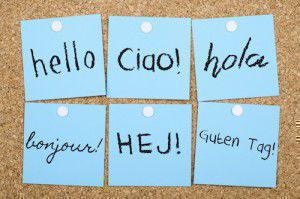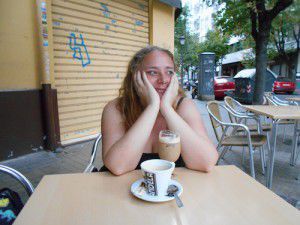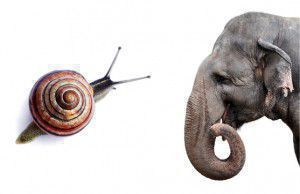Mum’s the word! How different languages say ‘mother’
Today is the day we celebrate ‘Mother’s day’ or ‘Mothering Sunday’ here in the UK.
Mum is one of those words we start to use from a young age; perhaps you used ‘mumma’, ‘mother’, ‘mam’ or ‘mummy’ instead; there are many ways to say it! Some languages offer a similar word to English, like ‘la madre’ in Spanish and in Italian. Typically the word for mother does start with an ‘m’ or a ‘b’ as these are soft and easy sounds when you’re a child, creating the ‘m’ noise is one of the easiest ones to make. In Afrikaans the word for mother is just ‘ma’ and in Swahili it’s ‘mama’.
However, that’s not always the case: in Fijian the word for mother is ‘tina’, in Kurdish (Sorani) it is ‘daik’ and in Swiss it is ‘d’Mueter’. In other languages the m or b is replaced with a ‘h’ sound – in Japanese mother is ‘haha’ and in Somalia it is ‘hooyo’. Would you expect ‘Whaea’ to translate into the English word ‘Mother’? This is perhaps one of the more unusual ways of saying mother in another language (Maori). Interestingly in Georgian, it is completely different to English, with ‘mama’ meaning father and ‘deda’ for mother.
When it comes to the Romance and Germanic languages, there are a lot of similarities between both ‘mother’ and ‘father’ translations. Father tends to start with a ‘p’ or a ‘b’ sound, which are also easy noises for children to make.
Here are some other words for ‘mother’ in different languages:
Slovak – matka
Scots Gaelic – a’ mhàthair
Hungarian – anya
Albanian – nënë
Tagalog – nanay
How do you say ‘mother’ in the language you’re learning?
Happy Mother’s Day to all the mums, tinas, madres and nanays – we hope you have a lovely day!
Alex
Learning languages helps me help other people
Darren took part in our uTalk Challenge in January this year, choosing Polish, and he’s continued in February with Czech. Here’s his language learning story…
My name is Darren, I’m from Bath, England, and my language journey really began about 10 years ago.
I had studied French and German at school but I didn’t really enjoy them. I didn’t realise how useful languages could be until a friend asked me to help her learn some Latin for her nursing exam. She gave me the list of things she needed to learn with a look of sheer terror on her face and I told her ways to easily remember each word. You could see the panic in her eyes fade as she realised she could remember everything after just a couple of hours.

Soon after, I started working with a lot of Polish girls. It was quite difficult because only one or two of them could speak English, so I decided to try to learn enough Polish to be able to say “Good morning”, “You need to do this…”, “Would you like a coffee?” and other essential phrases. My first few attempts at communication were hilarious! My pronunciation was terrible and led to smiles and giggles, but they were all really impressed that I even tried and my blushes soon turned to grins of pride. I started doing the same when other new people arrived and was soon spouting phrases in Polish, Hungarian, Latvian, Romanian, and Greek. The look of happy surprise as a nervous new employee is greeted in his or her own tongue is itself worth the effort of learning.
I try to study a different language every day of the week for about two hours. Now I have friends from all over the world and teach English as a Second Language so I am lucky enough to be able to practise different languages every day. I’ve lost count of the number of times I have been able to help someone in the street when they have asked someone in broken English if they know where some place is, or in a shop when they don’t understand what is being said to them by a cashier. One time I was even asked to help translate for a friend who had been attacked and needed to talk to the police. Languages are now very important in my life and are my biggest passion.
One last thing: my original attempts at speaking Polish eventually led to me marrying the girl of my dreams. Just another reason to start your own language adventure!
A Language Journey
Today we’ve got a fantastic guest post from Kelly Wang – English teacher, accidental traveller, cake whisperer, dinosaur believer – on her personal language learning journey.
If you’ve got a language story to tell, we’d love to hear it! Now over to you, Kelly…
My journey through languages began in sequins and shoulder pads.
At the age of seven I remember clutching a Pot Noodle (Chow Mein flavour, if you must know), with an A4 pad in front of me and one of those 10 coloured pens ready and poised, waiting for the Eurovision Song Contest.
It has long been a tradition in my family to watch the Eurovision together, and to give marks out of ten to the acts. And at that age, I was of the opinion that English was the only language in the world, so my marking scheme would include whether or not the songs were in English. No English? Nil points.
I even took exception to the fact that each country when giving their own points spoke in their own language. How rude.
Fast forward to the last year of primary school and we learnt a few French words like bonjour and le livre and la fenêtre.
I still thought English was the best language.
But then, on reaching secondary school, when we started to learn a ‘modern foreign language’ regularly (in my case, French), I loved it. I loved the idea of being able to speak to everyone, no matter the language. And better than that, I was picking it up pretty easily.
The following year there was a repeat performance with learning German, and I remember a sort of teenage arrogance of thinking that languages were going to be ‘my thing’, because by the time I was sixteen I could also say Θέλω να πάω σπίτι in Greek – Thélo̱ na páo̱ spíti (I want to go home).
Over the years I’ve flirted with a lot of languages. I tried Chinese for a while, but with the complicated tonation, I was more worried about causing offence with the way I said a word, and less worried about actually stringing a sentence together.
And then, I found my true language love. The one language I could lose myself in and spend hours learning just for fun. The one language I would squeal over if I heard it spoken in public. Which is Finnish. Naturally.
Finnish may sound like an odd choice, but it made perfect sense to me. What started with a passing interest listening to Finnish metal music erupted into a bit of an obsession when I found myself frustrated that I couldn’t understand the Finnish ice hockey commentary.
For almost two years, Finnish became my number one hobby. Being relatively self-disciplined when it comes to studies, I decided to learn through a mix of self study and online language exchanges. Many an adventure was had along the way, and that perhaps is a story for another time, but I loved it. No prepositions to learn because everything was a suffix, and by changing the word ending you could say a whole range of things about it: saunassa, saunasta, saunan (in the sauna, from the sauna, for the sauna). No articles, no need to wonder if your table was a girl and your chair was a boy, it didn’t matter. Neither did you have to refer to a person as he or she, one simple han and it was covered! Beautiful.
Fast forward another year, and I found myself attempting to get to grips with Hungarian. Now for those of you who don’t know, Finnish and Hungarian are cousins of the language world, and it depends on which scholar you speak to as to how close a family they are. My experience was that whilst it sounded an awful lot like Finnish, Hungarian was nothing like it at all, except for the odd words like toilet: Hungarian – vécé, Finnish vessa.
And currently, I find myself in Spain. Adamantly not learning the language.
Because the problem now, with being a ‘jack of all trades, master of none’ when it comes to language, is that they all get tangled up. A waiter asks me if I want a refill, I answer in a mix of Spanish and Hungarian. I overhear staff in my local Chinese supermarket and confuse them – and myself – by responding in Chinese rather than Spanish. And recently on a stopover in Paris, I managed to respond to questions in French but found myself asking questions in Finnish.
What I really could do with is a babel fish. Or to live in the TARDIS. Unfortunately, I am in the wrong reality for that. But. I still love languages.
So. I don’t know what the foreign language for me is going to be. Should I return to French, attempt to master Finnish, or take up something new like Dothraki? Or will that lead to more unnecessary tongue twisting? I just don’t know. Would you like to join me on my journey?
Kelly
Where it’s at – how to say @ in different languages
The other day a colleague was telling someone his email address in French. He was halfway through and ran across a problem. He didn’t know the word for “the little ‘a’ in the circle”. In English we just say ‘at’, but that translates as ‘à’ in French and that sounds remarkably like the letter ‘a’. See the problem?
What he should have said was ‘arobase’, but different cultures call it completely different things – from official names to animal-based nicknames. Below we’ve found some of the most creative words for “the little ‘a’ in the circle”:
Animals (With Curly Bits)
The Germans, Romanians and South Africans (among others) all describe it as a ‘monkey tail’.
Thai and Hungarian people call it a ‘worm’ and the Italians refer to it as a ‘snail’.
The Swedish and Danish describe the shape as an ‘elephant’s trunk’ and the Greeks think it looks more like a ‘duckling’.
Curly Food
In Catalan, the “little ‘a’ in the circle” is named after a swirly pastry called an ‘ensaïmada’.
In Hebrew it’s named after a strudel.
In Slovak, it’s named after a rolled pickled herring!
Other Uses
The “little a” isn’t only used in email addresses. In Spanish, the symbol is sometimes used to represent masculine and feminine gender in the same word, for example ‘amig@s’ means male and female friends, although this is frowned upon by the Real Academia Española, so we don’t recommend it!
And in Portugal and Brazil, the symbol is used in text messages to represent ‘french kiss’ – so be careful how you use it if you’re travelling in those countries…
What do you call the @ symbol?
What’s the hardest language to learn?
I remember the first day of my Hispanic Studies degree, when our head of department brought us all down to earth by reminding us that Spanish is one of the easiest languages to learn. Having all worked pretty hard to get there, we were quite offended, but looking back now, I have to admit he may have been right… Spanish follows relatively simple grammatical rules, and once you know the different sounds, you can look at any word, and even if you’ve never seen it before you’ll know how to pronounce it. Of course there are areas of difficulty, like the age-old ‘ser or estar’ debate and (every linguist’s favourite) the subjunctive, but on the whole it isn’t a nightmare to get to grips with.
So that got me thinking: what is the hardest language to learn? Obvious answers that spring to mind are languages like Arabic, Mandarin, Cantonese and Japanese, which use a completely different writing system to English and, in the case of the Chinese languages, rely heavily on tone of voice. Changing the way you say a word even fractionally can completely change its meaning – which makes learning the language seem pretty daunting.
Other languages that I’ve been told are really difficult to learn include Finnish and Hungarian, in this case because of their complicated grammar systems.
Of course this is all from an English speaker’s point of view. If I’d been brought up speaking another language then my ideas about which are most difficult would probably be totally different. I’m sure I’d find English quite hard if I weren’t a native speaker.
What do you think? Have you ever learnt a language that was particularly challenging?
Liz




